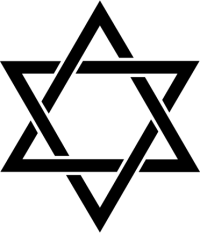Difference between revisions of "Judaism"
m (the spelling correction was legitimate) |
(ââEthnicities) |
||
| Line 17: | Line 17: | ||
*[[Reform Judaism|Reform]] | *[[Reform Judaism|Reform]] | ||
| â | ==Ethnicities== | + | == Ethnicities == |
| â | *[[Sephardi]] Jews | + | *[[Sephardi]] Jews. |
| â | *[[Mizrahi]] Jews | + | *[[Mizrahi]] Jews. |
| â | *[[Ashkenazi]] Jews | + | *[[Ashkenazi]] Jews. |
==Main Holidays== | ==Main Holidays== | ||
Revision as of 22:13, May 10, 2008
Judaism was the first monotheistic religion, dating back to around 2000 BC. Like Christianity and Islam, Judaism is an Abrahamic faith, tracing its origins to Abraham. However, the core of the Judaism as it exists today took shape when Moses led the Hebrews from Egypt and climbed Sinai, bringing back the Ten Commandments.
The five books of Moses (the Torah) are generally considered to be the core of the Jewish Scripture, and are supplemented by the works of the prophets and other writings which Christians call the Old Testament. Some Jews also consider the Talmud to be the recorded will of God, though within the Talmud there is extensive disagreement and lively discussion.
Jesus was one of many Jewish teachers who disagreed with the mainstream of Jewish practice. He founded a new school of thought, which flourished even after his death and eventually became Christianity. Christians consider him to be the Messiah and even consider him to be the Son of God.
Contents
Sabbath
Jews observe a weekly day of rest (the Sabbath) that begins shortly before sundown on Friday and ends after sunset on Saturday. During this time no work may be done.
Denominations
There are different branches of Judaism. From the most literal to the most interpretive in their practice:
- Ultra-orthodox
- Orthodox
- Conservative
- Reconstructionist
- Reform
Ethnicities
Main Holidays
- Pesach--celebrating the liberation from Egyptian slavery. Observant Jews hold a special festive meal, called a Seder, on the eve of Passover and do not eat leavened bread for the duration of the festival.
- Shavout-- Pentecost or Feast of Weeks. Traditionally celebrates God's giving the Ten Commandments at Mt. Sinai.
- Rosh Hashanah--New Years. Marks the creation of the world.
- Yom Kippur--the Day of Atonement. Observant Jews consume no food or drink for the entire day.
- Sukkot --Tabernacles or Feast of Booths. Observant Jews eat and sleep in temporary shelters shaded by cut vegetation.
- Shemini Atzeret and Simchat Torah--The day after Sukkot is a separate holiday, known as the "Eighth Day Feast." It also marks the completion of the cycle of reading the Torah in synagogues. The end of Deuteronomy is read, followed by the first chapter of Genesis.
- Chanukah (there are several English spellings)--celebrates the re-dedication of the Temple after the revolt against the Greeks recorded in the Books of Macabees. Jews light candles each night for eight nights, adding one candle each night.
- Purim--celebrates the thwarting of a plot to kill all Jews recorded in the Book of Esther, which is read aloud in its entirety in the synagogue.
- Tisha B'Av--a fast day that mourns the destruction of the Temple in Jerusalem.
Calendar
The Jewish calendar combines lunar and solar features. During Temple times, months began when the new moon was sighted in Jerusalem. An extra month was added when needed to keep the Pesach festival in the spring. Today a complex algorithm, over a thousand years old, is used to determine when months begin. As a result, the dates of the Jewish holidays in the civil calendar vary from year to year.
Jewish Scripture
Jewish Scripture consists of 24 books, broken down into three sections:
- Nevi'im --The Prophets: Joshua, Judges, Samuel, Kings, Isaiah, Jeremiah, Ezekiel and the 12 minor prophets
- Ketuvim---The Writings: Psalms, Proverbs, Job, Song of Songs, Ruth, Lamentations, Ecclesiastes, Esther, Daniel, Ezra, Chronicles.
The Torah is divided into portions that are read during synagogue services over the course of the liturgical year. Jews refer to all 24 sacred books as the Tanakh, an acronym of the three sections. The Old Testament is the Tanakh, except with some different naming and a different ordering than the Jewish version.
Dietary laws
Orthodox Jews follow a strict and complex set of rules governing what they may eat and drink. Permissible foods are called kosher. Per Biblical commandments, only animals that chew their cud and have cloven hooves may be eaten and they must be properly slaughtered. Fish must have fins and scales. Dairy products cannot be mixed with meat from animals or birds. Additional rules apply during Pesach.
Life cycle
Jewish boys are circumcised eight days after birth. They become adults for religious purposes when they turn 13, and event marked by a ceremony called a Bar Mitzvah. Similar ceremonies for girls, called Bat Mitzvah, were introduced in in the 20th century.
Jewish law only recognizes marriages between Jews. Divorce is permitted, but there are exacting rules that must be followed for the divorce to be valid, including the husband presenting a bill of divorce (Get) to his wife.
Jewish law requires bodies to be buried promptly, preferably no later than the day after death. Cremation is not permitted. There are prescribed stages of mourning for the first year after the death of a close relative (parent, sibling, spouse of child). The anniversary of such a death is observed with gifts to charity and the recitation of a prayer, Kaddish, praising God's name.
See also
- Bible
- Israel
- Synagogue
- Orthodox Judaism
- Jewish Republican
- Passover Seder
- Hebrew
- Aramaic
- Had Gadya
- Kaddish
External links
- Internet Jewish History Sourcebook
- Jewish Virtual Library
- Judaism 101 Tracey R Rich.
- Academic Jewish Studies Internet Directory
- AskMoses.com for questions about Judaism
- Chabad's Website
- Congregation Or Shalom The Conservative Synagogue.

